Prohibition Breweries: Victims, Survivors & Ghosts
Prohibition Breweries: Victims, Survivors & Ghosts
-
-
-
-
-
Prohibition Breweries: Victims, Survivors & Ghosts
-
Post #1 - December 13th, 2011, 12:14 pmPrior to the national mistake that was Prohibition, there were literally hundreds of breweries and distilleries in the midwest. Cities like Peoria which once produced more whiskey than any city in history(185,000 gallons every 24 hours) with 24 breweries and 73 distilleries.... Ample resources such as corn and wheat as well as artesian springs and a river network to transport raw materials and finished goods made for a perfect environment. Also the folks who knew how to make the beer and liquor had also settled in the area(irish, germans, etc).
Sadly the busybodies of the day used fear and underlying racism(anti irish, german & european) to push through prohibition, shuttering an industry and idling thousands of workers. A national disgrace.
With the above said & understood I have been searching out, researching, and visiting shuttered breweries in the Illinois River Valley. These long abandoned brick structures breathe history, and on my visits I am allowed to daydream and imagine how things were during a better time & place. I prefer the abandoned sites to breweries that have been converted to modern use right now, but I hope to visit the repurposed breweries as well. I prefer the abandoned ones as they can tell their story if you listen.
The first brewery I will profile is the Star Union Brewery in Peru, IL.
Once taking up acres of property on the north side of the Illinois River all that remains is a wooded area littered with bricks from the old smoke stack and other brick structures. The only building that remains is a portion of the bottling plant which is currently used by a distribution company. A search of the field is not possible(recommended) as it is private property and there have been some cave ins of some old tunnels that ran under the brewery to the river. A few respectfull pictures is all I took from the street.
Star Union Brewery produced beer from 1856 til January 9, 1966. One of the rare breweries that survived and then flourished for a time after Prohibition. A couple of beers produced here were the Seppl Brau & Star Model label during the 1920's and on.
I came across this old picture of the plant:
http://www.1964lp.com/nGallery/photos/11/47.aspx
I parked my truck between the tree and the building in the foreground and took my pictures from across the street. Really amazing to see the site now and how it was back in the day. I searched an address in Peru that used to be a Star Union Tied House, but there is nothing on that corner anymore.
Old bottling plant:

Hoerner building Peru, IL. former owner of Star Union: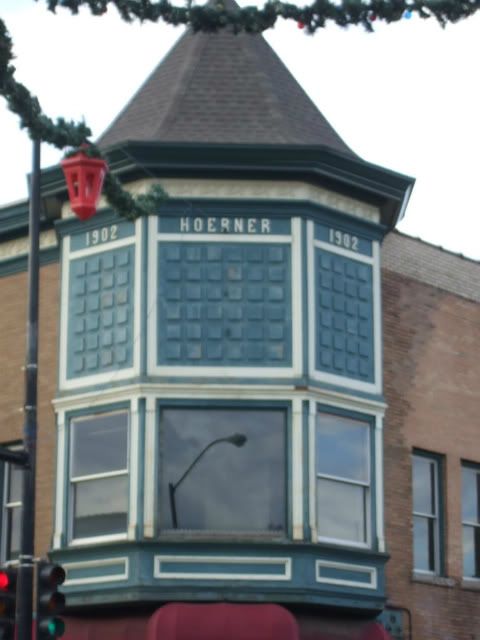
YOu can still find some relics of the Star Union Brewery around, this neon is @ the Waterstreet Pub(been a bar off and on since the late 1800's).. a few blocks from where the brewery once stood:
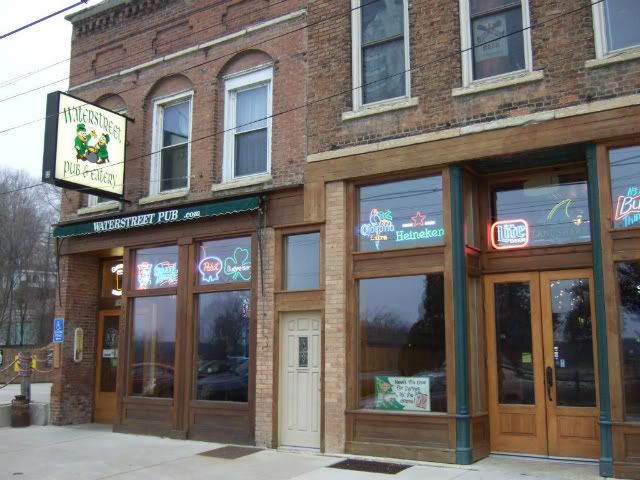
A fewe brewery items I found locally: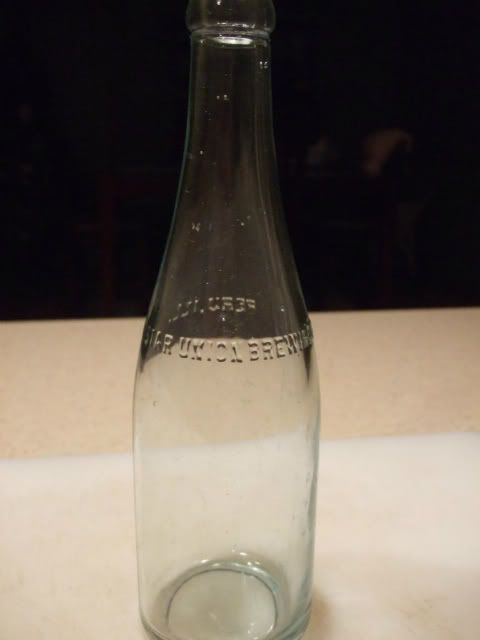
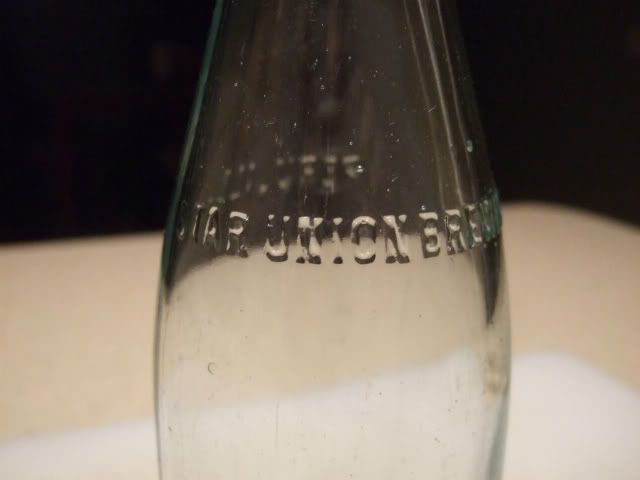
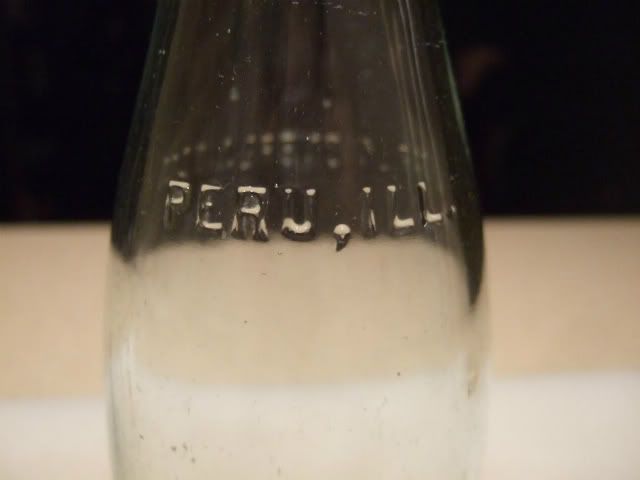
bottle opener(works damn well):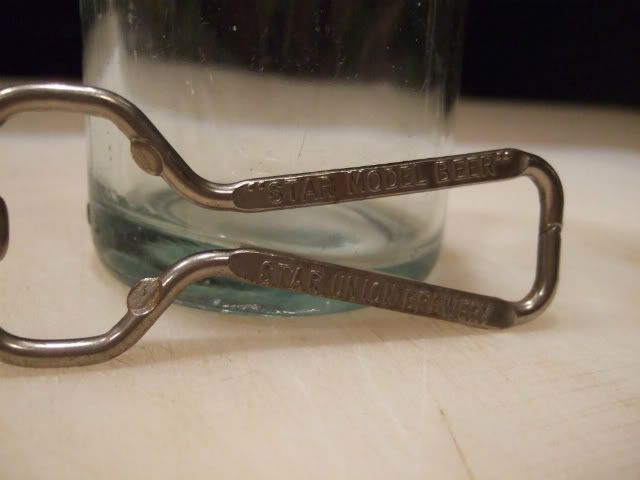
an ice pick from a local Peru bar: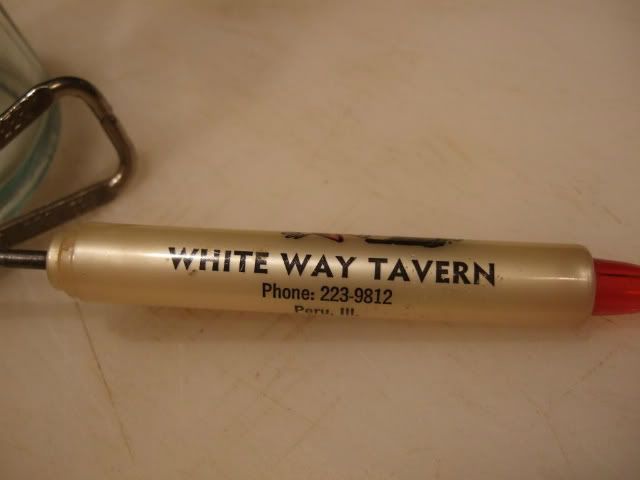
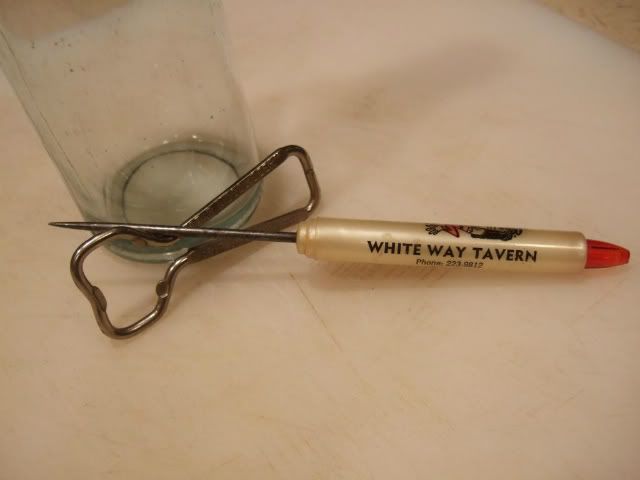
Issued permit # ILL-U-700 to allow the operation of a brewery in 1933 Repeal.
Also known as: Union Beer Co.(1877-1880), Union Brewing Co.(1880-1891), Star Union Brewing Co.(1891-1920), Star Union Beverages Co.(1920-1933), Star Union Products(1933-1966),
Star Union Brewery (closed)
102 Pike Street
Peru, IL.
The search will continue, I have 2 other brewerie sites I have visited(and more on my list), I just need to write them up...
edit: added photo of seppl brau: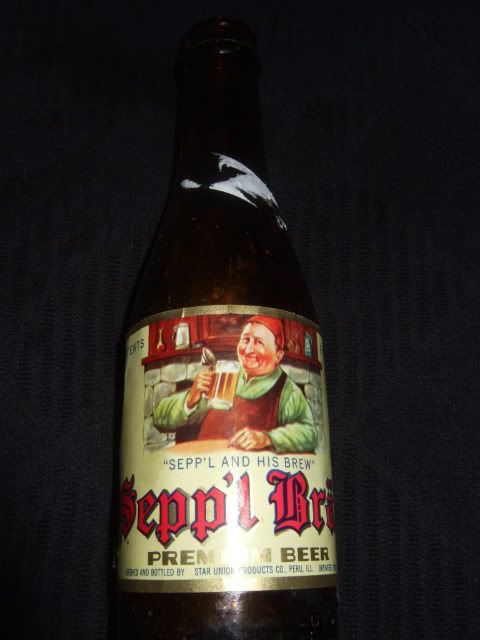 Last edited by jimswside on October 28th, 2013, 1:09 pm, edited 5 times in total.
Last edited by jimswside on October 28th, 2013, 1:09 pm, edited 5 times in total.
-
-
Post #2 - December 13th, 2011, 12:39 pmGreat report and shots, Jim.
It really is a shame how seriously prohibition derailed the culture of brewing and distilling in the U.S. I wonder where we'd be on the trail now, if not for those lost years.
I look forward to your next installment.
=R=By protecting others, you save yourself. If you only think of yourself, you'll only destroy yourself. --Kambei Shimada
Every human interaction is an opportunity for disappointment --RS
There's a horse loose in a hospital --JM
That don't impress me much --Shania Twain
-
-
Post #3 - December 13th, 2011, 1:37 pmronnie_suburban wrote:Great report and shots, Jim.
It really is a shame how seriously prohibition derailed the culture of brewing and distilling in the U.S. I wonder where we'd be on the trail now, if not for those lost years.
I look forward to your next installment.
=R=
thank you sir,
I agree, 14 years is a long time to not be working on your craft.
I have read that even in the 2 years before the Volsted Act(1919) materials for brewing beer, or distilling were hard to get because of WW I, & virtually impossible to obtain for a German owned brewery.
-
-
Post #4 - December 13th, 2011, 2:07 pmbeen wondering where you were!!! Great post--also looking forward to Chapter 2
 "Knowledge is knowing a tomato is a fruit; wisdom is not putting it in a fruit salad." Miles Kington
"Knowledge is knowing a tomato is a fruit; wisdom is not putting it in a fruit salad." Miles Kington
-
-
Post #5 - December 13th, 2011, 3:30 pmGebhard Brewery - Morris, IL.
This was the first site I visited on a sunny early November day. Located off the main drag in Morris, IL. near the river and backed by the Gebhard Woods. Right at the edge of a subdivision I would have been tempted by this treasure as a kid, and some kids did start a fire in the bottling plant a few years ago.
Founded in 1866 by Louis Gebhard the only buildings that remain are the brewhouse, and the bottling plant. A portion of the smoke stack is also still up. These brick buildings from that era were remarkably well built.
By 1870 the Gebhard Brewery was using 1/3 of the corn grown in Grundy County, and their beer was widely known. Sadly this brewery closed in 1919, never to brew beer again. The brewing equiptment was sold to a person from Shanghai China & shipped there according to a story I read. It was last used as a flour mill & has sat empty pretty much since. It is for sale @ $86,000 I believe.
The site is private property, and I respectfully walked around the outside of the brewhouse and snapped a couple quick pics. I have seen posts on the internet where folks have gone inside and snapped pics, really cool, but I will not go in. There was talk on one web forum of trying to reopen the brewery, not sure how feesible that is as there would be immense costs involved.
Here is a couple fantastic links of pics of the brewery back in the days:
http://city.mornet.org/html/industry.htm
http://grundycountyil.org/business/gebhardbrewery.jpg
Brewhouse: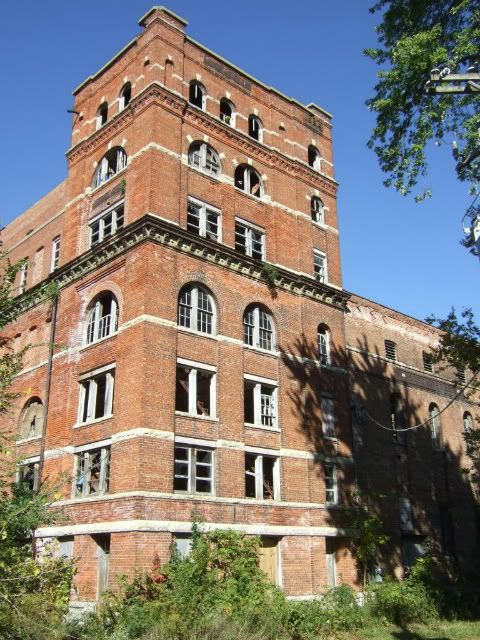
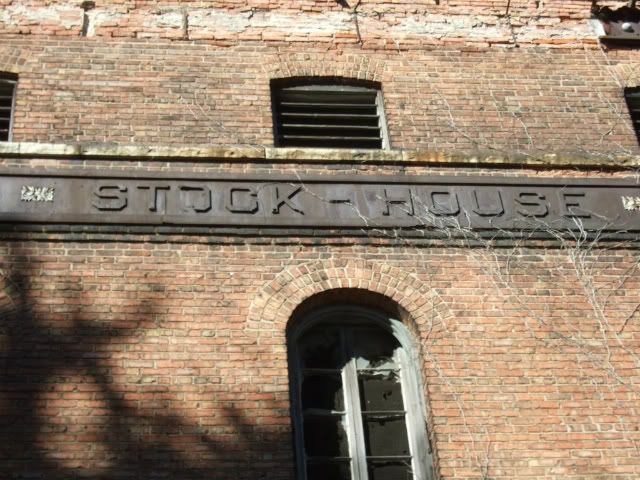

Bottling Plant:
Area between bottling plant and Brewhouse:
Gebhard Brewery Site
Morris, IL.Last edited by jimswside on January 10th, 2012, 2:03 pm, edited 1 time in total.
-
-
Post #6 - December 14th, 2011, 8:50 amFor anyone who likes this thread, try to catch the Travel Channel's "Off Limits" show that was set in St. Louis. This will probably be in reruns over the holidays. Don Wildman went to the Lemp brewery.
http://www.travelchannel.com/TV_Shows/O ... Louis.show"things like being careful with your coriander/ that's what makes the gravy grander" - Sondheim
-
-
Post #7 - December 14th, 2011, 11:22 amFascinating, but to add a little balance to the mourning over Prohibition -- there was a reason to derail all those distillers. This was a major feminist issue -- which is why Prohibition went into effect about the same time women got the vote. Susan B. Anthony was a Prohibitionist long before she became a Suffragist.
In the 1800s, there were no women’s shelters, and women didn’t control money or, generally speaking, have jobs, which meant women had no options other than just taking it when the menfolk came home staggering drunk. And before Prohibition, drunkenness was a problem of, well, staggering proportions. Some estimate that 50 percent or more of the male population was alcoholic, and even the non-alcoholics drank heavily—often (as noted in the article below) within a few points of lethal amounts of alcohol on a regular basis. And while a fair number of women drank, most women just bore the brunt of the abuse—or penury—that often went with male alcoholism.
As for the Puritans, on whom most people blame Prohibition, aside from having lived 300 years too early to have been involved, they were actually pretty heavy drinkers. Most Puritans were making hard cider in vast quantities, and they enjoyed gin. They didn’t approve of drunkenness, but they certainly had no problem with drinking. So we can’t pin this on them.
Just be glad that, as far as feminist causes go, we kept the vote but got rid of Prohibition. (But thank goodness we’re not consuming alcohol at the rate Americans were in the 1830s.)
Here are some quotes and some sites where you can confirm this information.
http://www.history.rochester.edu/class/sba/third.html
Susan B. Anthony's first involvement in the world of reform was in the temperance movement. This was one of the first expressions of original feminism in the United States and it dealt with the abuses of women and children who suffered from alcoholic husbands.
http://www.librarycompany.org/ArdentSpirits/temperance-women.html
Women were active in the temperance movement from the early 19th century and became its driving force in the 1870s. Women often made up significant portions of temperance organizations and formed all-female organizations as well. Because women lacked financial autonomy, the problem of male drunkenness was their problem. The temperance cause was an arena in which women could resist vulnerability to their husbands and lack of political and economic freedoms. Many important suffragists got their start in the temperance movement.
http://www.americanforeignrelations.com/Al-Am/Alcohol-Consumption.html
By the 1750s Americans were drinking heavily. Much of the rum was imported, and the rest was distilled in the seaports from molasses brought from the West Indies. Although available data is rough, by 1750 the colonists may have consumed more than 6 gallons of alcohol per adult per year, nearly triple the 2.2 gallons drunk in 1998. From the 1790s through the 1820s, whiskey use soared. Heralded as the national beverage, whiskey made getting drunk a patriotic gesture and an act of American pride.
Around 1800 settlement of the Middle West began, and that region's hot summers and excellent soil produced bumper corn crops. The result was a corn glut, which increased when Europe stopped buying American grain after the Napoleonic Wars ended in 1815. Desperate western farmers turned their corn into whiskey in order to afford the shipping costs of sending it to the East for sale. Whiskey became both cheaper and more plentiful. By the 1820s whiskey was five cents a fifth, cheaper than rum, wine, beer, milk, tea, or coffee. It was often safer to drink than water, too.
At the consumption peak, around 1830, Americans drank about seven gallons of alcohol per adult per year. This rate of use is among the highest ever recorded in any society and is close to the human body's physiological maximum capacity for intake of alcohol.
Adult white men drank the most, consuming perhaps as much as five-sixths of the liquor at an average rate of a half pint a day, but women also drank, often at home and sometimes for real or imagined health problems. Temperance leaders found it hard to defend limited use because no one agreed how much alcohol was safe. They also found that attacking whiskey while exempting wine did not work, because the poor would not give up cheap whiskey while the wealthy continued to drink expensive wine.
So yes, Prohibition was inconvenient and caused a few businesses to fail, but it may have saved the country. It certainly saved a lot of women."All great change in America begins at the dinner table." Ronald Reagan
http://midwestmaize.wordpress.com
-
-
Post #8 - December 14th, 2011, 11:27 amInteresting and timely topic, Jim - my work took me to Belleville, IL recently where they brewed Stag beer once upon a time. I didn't go see it, but I am told the brewery building is still standing. And my host during the visit share fun stories of how the Stag employees could drink all the product they could hold during the workday. He always wondered "now no one ever got hurt because those guys were drunk ALL the time..."
He also shared that, as a 10year-old child, he would be sent by his father to the corner tavern for a bucket of beer - and would be served without fail.
"The times, the are a changin..."Life is a garden, Dude - DIG IT!
-- anonymous Colorado snowboarder whizzing past me March 2010
-
-
Post #9 - December 14th, 2011, 11:30 amDavooda wrote:Interesting and timely topic, Jim - my work took me to Belleville, IL recently where they brewed Stag beer once upon a time. I didn't go see it, but I am told the brewery building is still standing. And my host during the visit share fun stories of how the Stag employees could drink all the product they could hold during the workday. He always wondered "now no one ever got hurt because those guys were drunk ALL the time..."
He also shared that, as a 10year-old child, he would be sent by his father to the corner tavern for a bucket of beer - and would be served without fail.
"The times, the are a changin..."
thanks,
interesting stories about the Stag plant and times.
Ill have to read up on the Belleville site & perhaps make a visit.
-
-
Post #10 - December 14th, 2011, 11:32 amgrits wrote:For anyone who likes this thread, try to catch the Travel Channel's "Off Limits" show that was set in St. Louis. This will probably be in reruns over the holidays. Don Wildman went to the Lemp brewery.
http://www.travelchannel.com/TV_Shows/O ... Louis.show
thanks for the link, Ill have to try to DVR it. The Lemp brewery site, the lemp mansion, & the caves & tunnels underneath are legendary.
I have permission to enter & revisit the last of the 3 closed breweries I visited in the last few weeks. Hoping to do that this weekend and write it up.
-
-
Post #11 - January 10th, 2012, 10:55 amOne that survived for a short time after Prohibition:
Peru Beer Co. - Peru, IL.
Known as the Peru Beer Co. from 1889 - 1920, closed in 1920 for Prohibition.
Reopened in 1933 - Permit # ILL-U-737 for the production of full strength beer. Closed in 1943.
Also known as: Peru Brewing Co. (1872-1888), Peru Products (1933-1943).
Brands: Favorite Stock Beer (1889-1920), Muenchener Style Beer (1889-1920), Favorite Beverage (1916-1933).
The bottling plant and a building connected to it remain standing, and for sale, $169,000 if I remember correctly. Buildings are in great shape, easily could be re-opened for many uses (restaurant, etc.). Chatting with some long time folks from Lasalle/Peru, not many could remember this brewery as it is a less famous one in town and closed 20+ years earlier than the Star Union Brewery down the street.
I found some bottles form this brewery for sale @ my source for these things, but didnt feel like dropping $20 for an empty bottle. Ill keep searching.

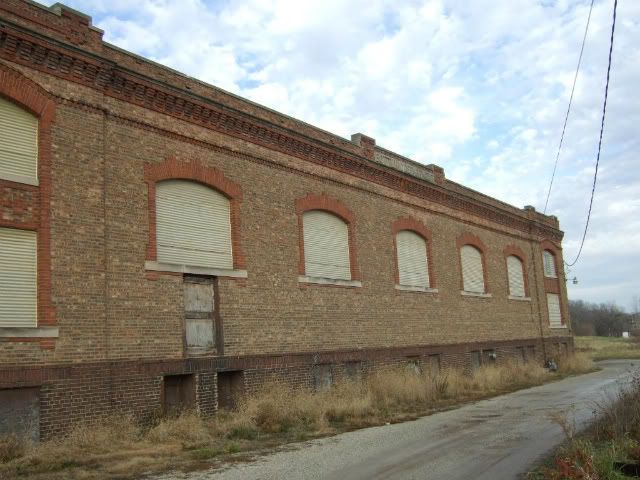
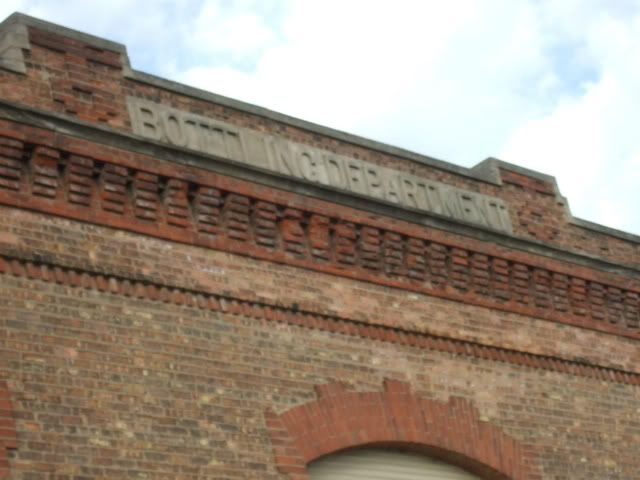
I have an offer to tour the inside of the above property, perhaps once the spring gets here and some free time presents itself.
While doing my research in Lasalle/Peru I became aware of a history and time when the LP area was referred to as "Little Reno". With casinos, clubs, etc. lining 1st Street in Lasalle, with clubs stretching to Spring Valley, and down to Oglesby. The time was the 1950's & 1960's. Since the brewery histories, and many of the local watering holes mirror the same time frame I am also visiting these pubs. Just another angle to explore in the IRV, with its rich and colorfull history.
Peru Beer Co. (closed)
Center street just east of Plain Street
Peru, IL.
-
-
Post #12 - February 7th, 2012, 10:56 amRolled into Joliet to check out the remains of the Sehring/Acme Brewing Co. Gotta say I love the name "Acme" if I ever open a company thats what it will be named.
Sehring Brewing Co. 1902-1920
Closed by Prohibition in 1920
Issued permit # ILL-U-792 in 1933 to resume producing beer
Acme Brewing Co. 1933-1939, brewery closed in 1939.
Brands: Standard Pale(1933-1935), Acme Beer (1933-1939), Home Trade Lager (1933-1939)
Located on the west side of Joliet in a residential neighborhood the malt house looms large, sitting @ 515 Summit. The malt house which is a step that has been largely phased out in the 20th Century is where they would essentially spread wet grain on the growing floor where it was turned at intervals for about 14 days before heading to the kiln. I imagine the smell of the grain fermenting then cooking down spread through the neighborhood.

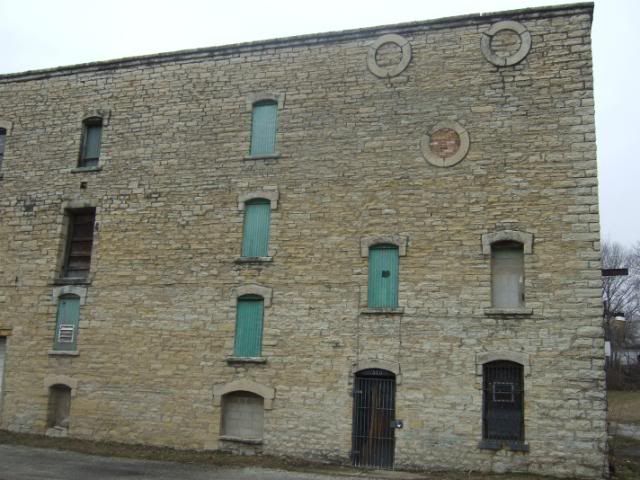

this home looks over the former siteof the brewhouse which was torn down and is now a Joliet Diocees building, investigating if they were the owners perhaps: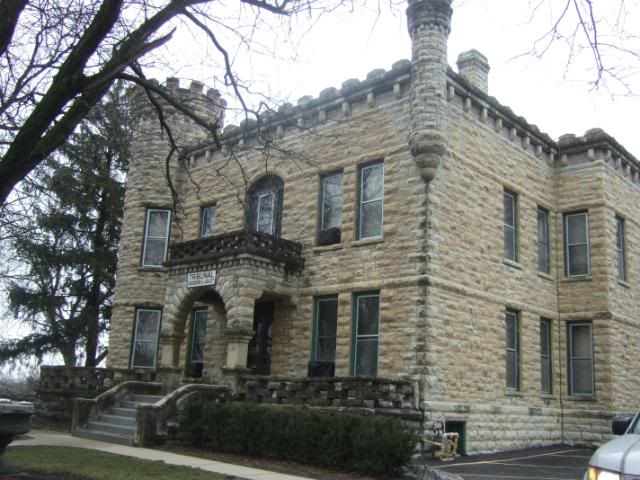
Sehring/Acme Brewry Malthouse(closed)
515 SUmmit
Joliet, IL.
-
-
Post #13 - February 8th, 2012, 1:42 pmInteresting work Jim. There are so many interesting old industrial buildings in that region that remain pretty much intact. Besides cost, I wonder why some of them haven't been rehabbed. Here is my town we have many old limestone/sandstone building that have been rehabbed and made into office space. Our City Hall and Police station are sandstone buildings that were part of a windmill factory that is from the 1860's when there were 4 windmill factories in town. The stone was all locally mined.
-
-
Post #14 - February 8th, 2012, 2:51 pmLikestoEatout wrote:Interesting work Jim. There are so many interesting old industrial buildings in that region that remain pretty much intact. Besides cost, I wonder why some of them haven't been rehabbed. Here is my town we have many old limestone/sandstone building that have been rehabbed and made into office space. Our City Hall and Police station are sandstone buildings that were part of a windmill factory that is from the 1860's when there were 4 windmill factories in town. The stone was all locally mined.
ive been having alot of fun researching and visting. I have learned alot about the history of the area that have become side projects while studying the brewing history.
Those old brick buildings do stand the test of time and should be repurposed., perhaps rehabbing is too cost prohibitive vs a cheaper new construction.
I am heading east into Chicago for my next breweries.
-
-
Post #15 - February 8th, 2012, 3:58 pmJust as an offhand comment on old buildings in the Illinois Valley, I was really sad to see the Westclock factory in Peru burn down. Sad that it was teenage vandals. We drove by it many times going to Peoria our various routes and it had been repurposed and used by a number of tenants.
-
-
Post #16 - February 8th, 2012, 4:08 pmLikestoEatout wrote:Just as an offhand comment on old buildings in the Illinois Valley, I was really sad to see the Westclock factory in Peru burn down. Sad that it was teenage vandals. We drove by it many times going to Peoria our various routes and it had been repurposed and used by a number of tenants.
We just happened to be in Peru the first day of the fire, seemed like everyone in town was in their car trying to get a look at this big part of the cities history burn, definitely a shame, I think they lost 1/3 of the factory, the office building portion is untouched.
-
-
Post #17 - February 8th, 2012, 9:37 pmLove this series; eagerly awaiting the Chicago sets!
-
-
Post #18 - February 12th, 2012, 11:04 amI had some free time yesterday and ventured over to the Morris area to visit the Aux Sable Cemeter, an old station from the time the Interurban ran, connecting the towns of the IVR, and a revisit to Gebhard, the site appears to be being prepped for something, at least the Brewhouse building, I believe the bottling plant is owned by a different person. More no tresspassing signs around. I approached from the river and got some different persepective of the size of the place.
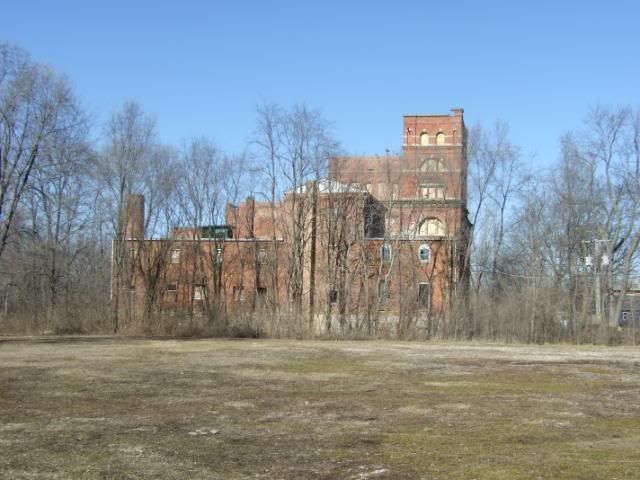
backside of bottling plant:

-
-
Post #19 - July 3rd, 2012, 7:54 amtaking a wrong turn sometimes works out, spotted this old Star Union Building off the beaten path in Lasalle while looking for my daughters private school. THis building caught my eye & brought a smile to my face...
Figuring from the location in town(a residential neighborhood with quite a few bars) & appearance it is not a production facility but perhaps a Star Union Brewery Tied House, gotta do some digging.
Approx: 1080 8th Street - Lasalle, IL.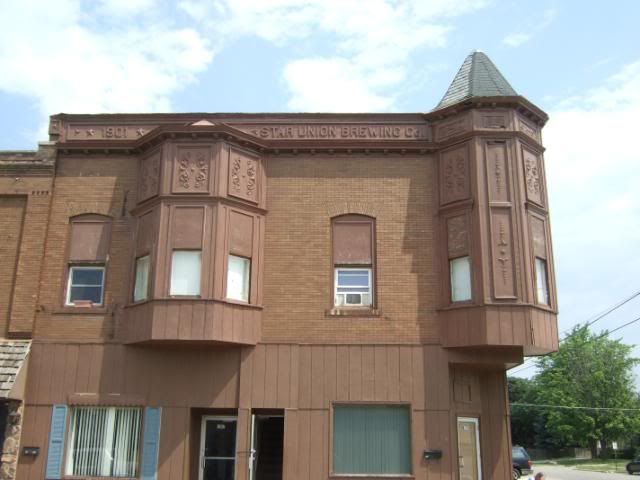

-
-
Post #20 - July 3rd, 2012, 9:32 amGood eye!
-
-
Post #21 - September 13th, 2012, 3:16 pmReviving the topic but I just managed to come back to the forums and noticed it while getting caught up.
My dad grew up less than a block from the Star Union brewery on Brewster Street (good name being so close to a brewery).
He and both grandfathers, in fact, worked at the brewery. I think that's how he met my mother.
In addition to Sepp'l Brau and Star Model, they also had (at least) a Bock beer. That was the first time I heard the story about Bock beer coming from the bottom of the tanks/barrels.
Dad was a huge collector of Start Union / Star Model paraphernalia; I think one of the breweriana associations even wrote about it many years ago. I got the whole shooting match when he passed away. Some day, I hope to finish off the basement as a pub and bring everything out of storage. Not sure where I'll hang the 3x6' outdoor sign that's sitting in the garage.
Some folks tried to resurrect the company name and brands in the 80s/90s. I only recall them making the Star Model pilsner/lager brand. I think they were based in Hennepin but the beer was most likely contract brewed elsewhere. They didn't last long, however.
Joe
-
-
Post #22 - September 13th, 2012, 3:32 pmjpreiser wrote:Reviving the topic but I just managed to come back to the forums and noticed it while getting caught up.
My dad grew up less than a block from the Star Union brewery on Brewster Street (good name being so close to a brewery).
He and both grandfathers, in fact, worked at the brewery. I think that's how he met my mother.
In addition to Sepp'l Brau and Star Model, they also had (at least) a Bock beer. That was the first time I heard the story about Bock beer coming from the bottom of the tanks/barrels.
Dad was a huge collector of Start Union / Star Model paraphernalia; I think one of the breweriana associations even wrote about it many years ago. I got the whole shooting match when he passed away. Some day, I hope to finish off the basement as a pub and bring everything out of storage. Not sure where I'll hang the 3x6' outdoor sign that's sitting in the garage.
Some folks tried to resurrect the company name and brands in the 80s/90s. I only recall them making the Star Model pilsner/lager brand. I think they were based in Hennepin but the beer was most likely contract brewed elsewhere. They didn't last long, however.
Joe
Man thats cool you got all them old Star Union items.
THanks for the added info, I hope to resume this project soon.
-
-
Post #23 - September 15th, 2012, 9:19 amI have loved this thread. Keep going Jim!
-
-
Post #24 - October 1st, 2012, 7:41 amSchoenhofen Brewery site on the SW side(18th @ Canal).
Well known, kind of following in the tracks of the greats checking this place out. Quite a few buildings still up, some neat details on the buildings. Interesting tidbits about the aquifer located below the brewery that was used in brewing the beer, to stories of the Schoenhofen family being german spies during WWI boradcasting messages from a tower on the property.
Brewers of Edelweiss beer.
Est. 1860 - closed 1924
Lots online about this brewery(Forgotten Chicago has a brilliant write up), Buildings are cool. Especially the detail of the Brewers Star on the Admin. Building.
a couple pics of the Admin. building: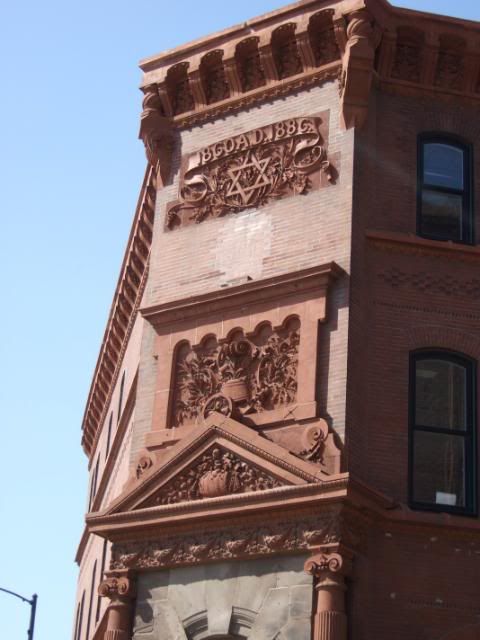
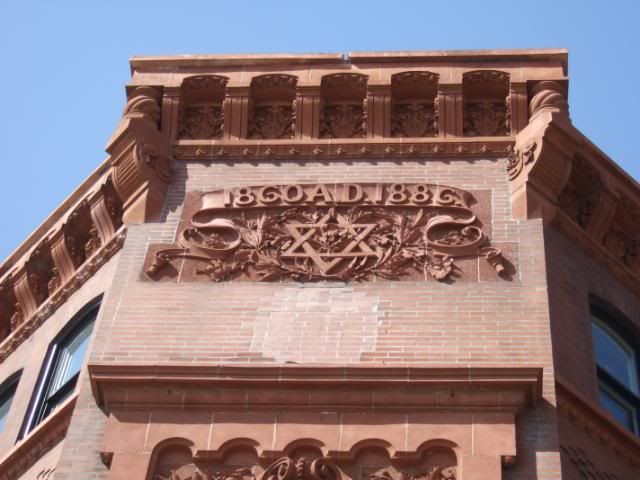
Powerhouse Building - built 1902:

More buildings to check out when I have more time.
-
-
Post #25 - October 1st, 2012, 8:43 amJim, do you know what this building is used for now, it looks in good shape.
-
-
Post #26 - October 1st, 2012, 9:11 amLikestoEatout wrote:Jim, do you know what this building is used for now, it looks in good shape.
I am not sure, many of the buildings look to be in use as perhaps warehouse space. The power plant building is fenced in.
Another interesting tidbit, the Admin building is at the corner of 18th & Normal, is where Jake and Elwood turned right to visit the St. Helen of the Blessed Shroud Orphanage in the Blues Brothers movie., the orphanage was actually a fake building front at the end of this now dead end street.
http://www.bluesbrotherscentral.com/loc ... -orphanage
-
-
Post #27 - October 1st, 2012, 11:15 amCool thread.
-
-
Post #28 - October 4th, 2012, 10:53 amEnjoying the series and looking forward to more.jimswside wrote:Schoenhofen Brewery site on the SW side(18th @ Canal). … Buildings are cool.
Schoenhofen's tomb at Graceland Cemetery is cool too.


Schoenhofen Tomb
Graceland Cemetery
Entrance at Clark & Irving Park
Tomb is just south of Lake Willowmere
Chicago
-
-
Post #29 - October 5th, 2012, 8:46 amThanks for sharing the pics of the tomb, Really interesting/ornate detail.
-
-
Post #30 - March 18th, 2013, 7:53 amMan, Indiana has a rich brewing history, while reading some background on a couple breweries in South Bend I read entry after entry of former breweries in the Hoosier state.
Checked out the old South Bend Brewing Co.(Hoosier Beer) buildings over on LincolnWay West in South Bend. Cant miss the large brick structures with the castle/fortress design.Back in 1900 a group of local tavern owners formed this brewery and produced Hoosier Beer. Then during prohibition Hoosier Cream Soda & a near beer. After prohibition they went back to making Hoosier beer until the brewery closed in 1949
Main building(brewhouse) was built in 1903:
front: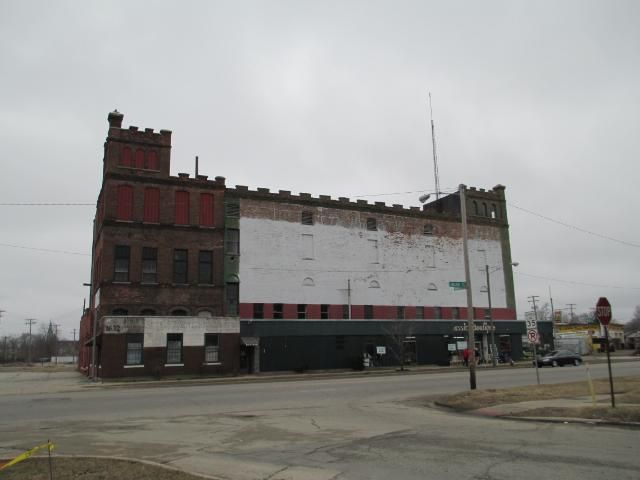
cool detail: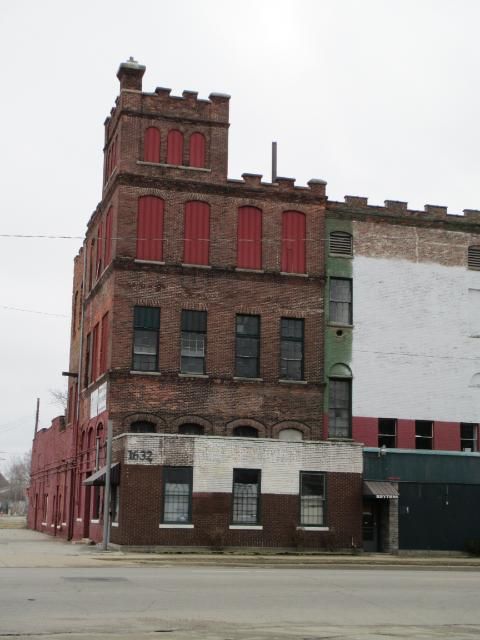
back:
Bottling plant was built in 1910: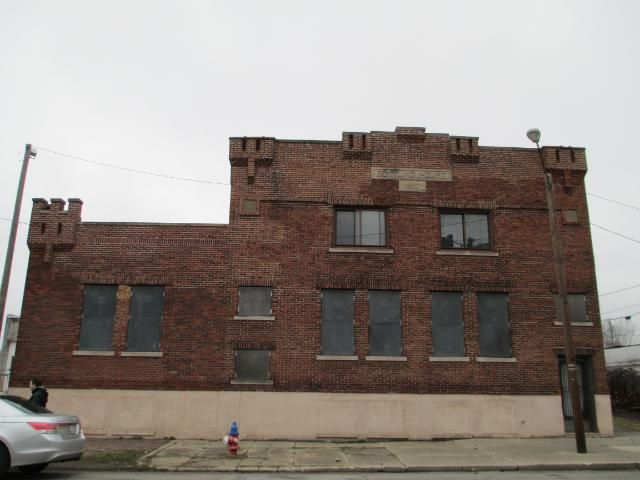


South Bend Brewing Co.(brewhouse building)
1636 Lincolnway West
South Bend, IN.
Bottling plant is located around the corner from the brewhouse, on College Ave.

